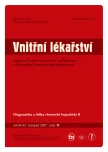-
Medical journals
- Career
Endoscopic cytoscopy
Authors: Z. Beneš 1; O. Daum 2; G. Puškárová 1; P. Kohout 1; Z. Antoš 1; M. Černík 1
Authors‘ workplace: II. interní klinika Fakultní Thomayerovy nemocnice Praha, přednosta MUDr. Zdeněk Beneš, CSc. 1; Oddělení patologie FN Plzeň, přednosta prof. MUDr. Michal Michal, DrSc. 2
Published in: Vnitř Lék 2007; 53(11): 1215-1219
Category: Reviews
Overview
A number of new endoscopic methods have been developed recently, which aim to allow the most accurate possible viewing of the mucosa of the digestive tract. These procedures include endoscopic cytoscopy, which together with confocal endoscopy is a technique of so-called endoscopic microscopy. By means of enodcytoscopy it is possible to view „in vivo“ the morphological details of the surface of the mucosa of the digestive tract. The mucosa must, however, be thoroughly cleaned and stained with methylene blue. The paper presents our own initial experience of this method, which may lead to faster and more accurate diagnosis of pre-tumorous or tumourous inflammation processes in the mucosa of the digestive tract.
Key words:
endoscopic microscopy – endocytoscopy – morphological changes of mucosa
Sources
1. Fuji T, Lishi H, Tatsuta M et al. Effectiveness of premedication with pronase for improving visibility during gastroendoscopy a randomized controlled trial. Gastrointest Endosc 1998; 47 : 382-387.
2. Chiu PWY, Inoue H, Satodate H et al. Validation of the quality of histological images obtained of fresh and formalin-fixed specimen of esophageal and Bystric mucosa by laser-scanning confocal microscopy. Endoskopy 2006; 38 : 236-240.
3. Inoue H, Kudo S, Shiokawa A. Novel Endoscopic Imaging Techniques toward in vivo Observation of Libiny Cancor Cells in the Gastrointestinal tract. Dig Dis 2004; 22 : 334-337.
4. Inoue H, Sasajima K, Kaga M et al. Endoscopic in vivo evaluation of tissue atypia in the esophagus using a newly designed integrated endocytoscope: a pilot trial. Endoscopy 2006; 38 : 891-895.
5. Kakeji Y, Yamaguchi S, Yoshida D et al. Development and assesment of morphologic criteria for diagnosing Bystric cancer using confocal endomicroscopy: an ex vivo and in vivo study. Endoscopy 2006; 38 : 886-890.
6. Kumagai Y, Monma K, Kawada K. Magnifying chromoendoscopy of the esopghagus: In vivo pathological diagnosis using an endocytoscopy system. Endoscopy 2004; 36 : 590-594.
7. Saito N, Sato F, Oda A et al. Removal of mucus for ultrastructural observation of the surfaře of human epithelium using pronase. Helicobacter 2002; 7 : 12-115.
8. Sakashita M, Inoue H, Kashida H et al. Virtual histology of colorectal lesions using laser-scanning confocal microscopy. Endoscopy 2003; 35 : 1033-1038.
9. Sano Y, Saito Y, Fu K et al. Efficacy of magnifying chromoendoscopy for the differential diagnosis of colorectal lesions. Digestive Endoscopy 2005; 17 : 105-116.
10. Sasajima K, Kudo S, Inoue H et al. Real-time in vivo virtual histology of Colorectal lesions when using the endocytoscopy system. Gastrointest Endosc 2006; 63 : 1010-1017.
Labels
Diabetology Endocrinology Internal medicine
Article was published inInternal Medicine

2007 Issue 11-
All articles in this issue
- Diagnostic benefit of the use of implanted loop recorder (Reveal Plus) for patients with syncope with unclear aetiology
- Long term results of cardiac resynchronisation therapy for patients with severe heart failure
- Utilisation of Glykogen Phosphorylase BB measurement in the diagnosis of acute coronary syndromes in the event of chest pain
- Basic fibroblast growth factor (bFGF) and vascular endothelial growth factor (VEGF) are elevated in peripheral blood plasma of patients with chronic lymphocytic leukemia and decrease after intensive fludarabine-based treatment
- Variability of plasmatic levels of big endothelin and NT-proBNP in patients with heart failure in a chronic haemodialysis programme
- Endoscopic diagnosis and treatment of biliary complications after laparoscopic cholecystectomy
- The influence of obesity on the gene expression of adiponectin and its receptor in subcutaneous adipose tissue
- Rituximab (MabThera®) – a new biological medicine in rheumatoid arthritis therapy
- Superior vena cava syndrome (definition, aetiology, physiology, symptoms, diagnosis and treatment)
- Endoscopic cytoscopy
-
Diagnostika a léčba chronické hepatitidy B
Doporučený postup České hepatologické společnosti České lékařské společnosti J. E. Purkyně a Společnosti infekčního lékařství České lékařské společnosti J.E. Purkyně
- Internal Medicine
- Journal archive
- Current issue
- Online only
- About the journal
Most read in this issue- Superior vena cava syndrome (definition, aetiology, physiology, symptoms, diagnosis and treatment)
- Rituximab (MabThera®) – a new biological medicine in rheumatoid arthritis therapy
- Diagnostic benefit of the use of implanted loop recorder (Reveal Plus) for patients with syncope with unclear aetiology
- Endoscopic diagnosis and treatment of biliary complications after laparoscopic cholecystectomy
Login#ADS_BOTTOM_SCRIPTS#Forgotten passwordEnter the email address that you registered with. We will send you instructions on how to set a new password.
- Career

